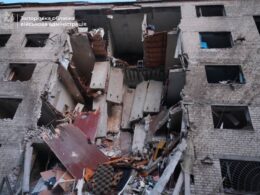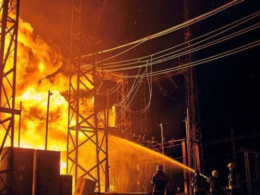Three Ukrainian nuclear power plants have largely restored their electricity production after implementing precautionary output reductions following November 28 Russian attacks on the country's energy infrastructure. The UN's International Atomic Energy Agency (IAEA) reported this, failing to mention Russia in its report on 5 December.
The report, titled "Update 263 – IAEA Director General Statement on Situation in Ukraine" says that the Khmelnytskyy, Rivne, and South Ukraine nuclear power plants, operating eight out of nine reactors, have gradually increased their output "after the military strikes on 28 November, which affected electrical infrastructure that is essential for nuclear safety." The IAEA reports that some off-site power lines used for receiving and transmitting electricity remain disconnected.
According to the report, IAEA Director General Rafael Mariano Grossi stated:
"A stable electricity grid that provides secure off-site power is essential to ensure nuclear safety at Ukraine's operating nuclear power plants," he said, noting the facilities' importance during winter months.
The IAEA teams stationed at the facilities reported maintained nuclear safety and security despite ongoing challenges. At Khmelnytskyy, team members required brief shelter on 3 December, while at South Ukraine, 17 drones were detected approximately three kilometers from the site.
The Zaporizhzhia Nuclear Power Plant (ZNPP), Ukraine's largest, has not generated electricity for over two years, with all six units in cold shutdown, IAEA says without any mention of the fact that the facility has been occupied by the Russian forces since 2022.
The ZNPP experienced recent power line disruptions, with its 750 kilovolt line disconnected between 21-23 November and its 330 kilovolt backup line disconnected for two days the following weekend, as per the report.
The IAEA team continues monitoring maintenance activities at Zaporizhzhia, including safety system elements and repairs. The team reports hearing distant explosions most days, though no damage to the plant was reported.
Related:
- IAEA: Nuclear safety at risk as Ukraine nuclear plants cut output after Russian attack
- Ukraine downs 79/91 missiles as Russia targets power grid
- Should Ukraine have nuclear weapons? Philosopher Slavoj Žižek speaks out
- Widespread power outages follow Russian drone and missile assault on Ukraine
- Russian strikes on Ukrainian nuclear power plants could cause nuclear disaster
- Occupied Zaporizhzhia nuclear plant risks blackout after Russian shelling disables power line





